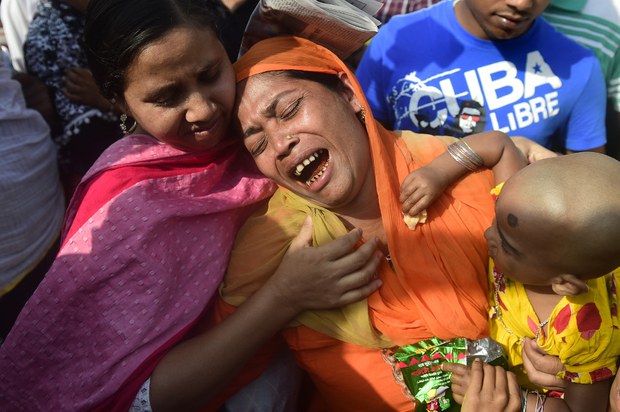Bangladeshis Commemorate Rana Plaza Disaster
2015.04.24
 Bangladeshi mourners gather at the site of the Rana Plaza building collapse in Savar, near Dhaka, April 24, 2015.
Bangladeshi mourners gather at the site of the Rana Plaza building collapse in Savar, near Dhaka, April 24, 2015.
Friday marked the second anniversary of the Rana Plaza collapse near Dhaka, one of the world’s worst industrial accidents, but Bangladesh’s garment factories still largely remain unsafe and many victims have yet to be compensated adequately for their suffering, survivors, victims’ relatives and labor activists say.
In addition, families of 159 Rana Plaza workers still listed as missing have received no compensation at all for their losses.
On Friday, about 2,000 Bangladeshis who survived the April 24, 2013 collapse of the eight-story building, which housed five garment factories, gathered at the site to commemorate the anniversary, Agence France-Presse reported.
The mother of Rasheda Begum, one of the workers who died that day, joined a march on Friday demanding better financial compensation.
“The day my daughter died, her father suffered a stroke,” Sofura Katun told the Associated Press. “He has been severely ill for the last two years. Now I am helpless. I have no one to support me.”
As many as 1,135 people – mostly garment workers – were killed and some 2,000 others were injured in the collapse of the overcrowded structure, whose shoddy construction had violated building codes.
Sohel Rana, the building’s owner, and 11 others, including two factory owners and two design engineers, were arrested after the accident. All but two – Rana and a factory owner – have been released on bail.
The tragedy focused international attention on unsafe and exploitative working conditions at the nation's 3,500 garment factories, and forced global retailers to address structural and environmental deficiencies in Bangladesh's garment sector.
The industry employs nearly three million people, mostly women.
“We had high hopes that the Rana Plaza collapse would be a wake-up call for the government and the retailers,” Taslim Akther, a union leader, told AFP.
“Two years on, many factories are far from safe. We have had several deadly factory fires since Rana Plaza. Millions of workers still don’t have enough labor rights,” he said.
A fund for the victims
Amid mounting criticism about inadequate compensation, Labor and Employment Secretary Mikail Shipar told reporters Thursday that the Rana Plaza Global Donors Trust Fund, created to help the victims, had been notified about the 159 missing workers.
“At present, it [Trust Fund] does not have sufficient funds. The assistance can be given once organizations that have promised money make their contribution,” he told a news conference at the Prime Minister’s office.
The International Labor Organization (ILO), in collaboration with European and American retailers – which are the major buyers of Bangladesh ready-made garments – had created the $30 million-fund to compensate the victims as well as create safe and environmentally friendly factories.
However, according to Transparency International Bangladesh (TIB), an anti-corruption watchdog, only $21.5 million out of the $30 million has been received, and only $15 million has been distributed among the victims as compensation.
Fourteen retailers, including Lee Cooper, J.C. Penney, Matalan and Carrefour – firms that bought garments directly from the Rana Plaza factories – have paid no money at all, TIB alleges.
Walmart, the American retail giant, also is being blamed for not having done enough for the victims.
According to British advocacy group Labor Behind the Label, Walmart recently donated a confidential amount to the fund, in the vicinity of $500,000, which it says is grossly inadequate,
Safety measures
In the aftermath of the Rana Plaza collapse and a fire in November 2012 that killed 112 garment workers at the Tazreen Fashions factory, the ILO launched a $27.8 million-program to improve working conditions in the garment sector.
In a report released last week, ILO said that inspections were going on as planned and that 2,703 out of 3,508 factories had been inspected for fire safety, electrical and structural design issues. Of them, only 32 were found to be unsatisfactory.
Separately, ILO, along with the International Finance Corporation (IFC), an affiliate of the World Bank, launched the “Better Work Bangladesh” initiative that is working with 30 factories to improve conditions. These produce garments for 13 foreign retailers and employ 54,000 workers.
In addition, ILO has arranged training for 700,000 workers on health and safety issues.
Government-BGMEA response
Shipar, the Labor secretary, said a total of 2,871 victims had applied for financial compensation and that 2,839 of them had received money after being approved for cash payouts.
Cash compensation has ranged from 740,000 taka ($9,577) to 1.5 million taka ($19,340) per victim or surviving family.
According to State Minister for Labor Mujibul Haq Chunnu, the government is serious about ensuring that all of the victims are adequately compensated and rehabilitated.
“We’re doing our best to help the victims and we’ll continue to provide assistance to them as long as they need,” he told BenarNews.
Atiqul Islam, president of the Bangladesh Garment Manufacturing and Exporters Association (BGMEA), struck an optimistic note.
“We’ve been able to overcome the crisis in collaboration with the government, international retailers and other stake holders. We’ve provided adequate compensation to the dead and injured and we’ll continue to help them in the future,” he told BenarNews.
‘Inadequate compensation’
Labor groups and victims, however, dispute the government’s and industry’s claims, saying that most of the victims are still struggling to cope two years after the disaster.
Rafiqul Islam Shujon, president of the Bangladesh Garments and Industries Labor Federation, called the claims of both the government and BGMEA a “travesty of truth.”
“Workers’ blood does not have any value to them. That’s why they haven’t paid the legitimate compensation to the dead and injured victims or their families yet,” he told BenarNews.







